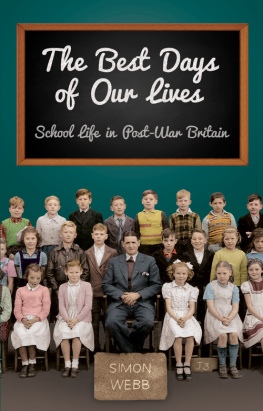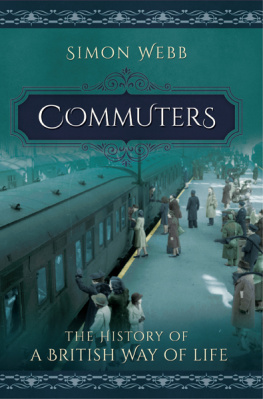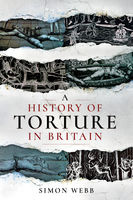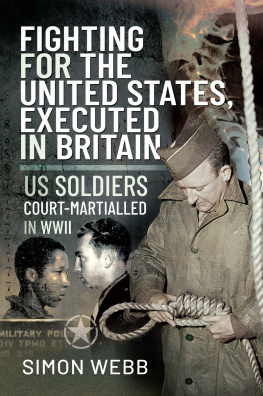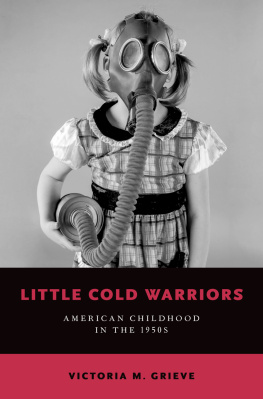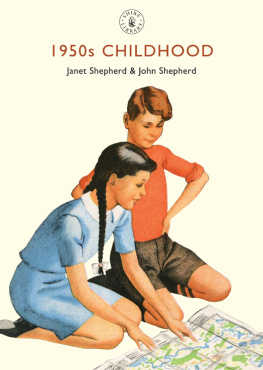Post-War Childhood
Post-War Childhood
Growing up in the not-so-friendly Baby Boomer years
Simon Webb
First published in Great Britain in 2017 by
P EN & S WORD H ISTORY
an imprint of
Pen & Sword Books Ltd,
47 Church Street,
Barnsley,
South Yorkshire,
S70 2AS
Copyright Simon Webb, 2017
A CIP record for this book is available from the British Library.
ISBN 978 1 47388 601 8
eISBN 978 1 47388 603 2
Mobi ISBN 978 1 47388 602 5
The right of Simon Webb, to be identified as the Author of this Work has been asserted by him in accordance with the Copyright, Designs and Patents Act 1988.
All rights reserved. No part of this book may be reproduced or transmitted in any form or by any means, electronic or mechanical including photocopying, recording or by any information storage and retrieval system, without permission from the Publisher in writing.
Pen & Sword Books Ltd incorporates the Imprints of Pen & Sword Aviation, Pen & Sword Maritime, Pen & Sword Military, Wharncliffe Local History, Pen & Sword Select, Pen & Sword Military Classics and Leo Cooper.
For a complete list of Pen & Sword titles please contact
Pen & Sword Books Limited
47 Church Street, Barnsley, South Yorkshire, S70 2AS, England
E-mail:
Website: www.pen-and-sword.co.uk
List of Plates
A road sign from the 1950s.
Boys trainspotting at a railway station.
A playground in 1950s Britain.
The playground rocking horse, cause of many serious injuries.
A 1957 advertisement for air rifles.
An open penknife.
A knife as a souvenir from the seaside.
An air pistol in the Webley catalogue.
Housewives cleaning their front steps in the 1950s.
Newspaper headlines from 1960 and 1964.
Children playing on a bomb site in the 1950s.
Children on a bomb site fool around with a pickaxe.
A remaining bomb site in London.
An iron lung.
A ward full of children in iron lungs.
Introduction
We are all of us familiar with old people who contend that when they were young, everything was a great improvement on the present day. Children in the past, for instance, were better behaved, healthier, more polite to, and respectful of, their elders, showed greater courage and resourcefulness, read more and generally had a higher level of educational attainment into the bargain. This type of false-memory syndrome has been a traditional affliction of the elderly since time out of mind. The latest generation to fall prey to such distorted views of the past is of course that of the so-called baby boomers; those born roughly between 1946 and 1964. Enormously entertaining though it is to observe the Flower Power children of the 1960s turning into querulous old men and women who complain that the country is going to the dogs and that childhood isnt a patch on it what it was when they were themselves youngsters, there is a more serious side to the matter.
The childhood years of the baby boomers have not only become the object of immense and unremitting nostalgia, but the practices and customs of those days as regards children are now being widely advocated as the perfect model of childhood. In newspapers, magazines, books and websites, the way of life for children in the 1950s is now viewed as a desirable pattern to follow. It is as though schooldays in the 1950s and 1960s have become universally accepted as some Platonic ideal of childhood; the yardstick and touchstone against which all other childhoods, especially those of today, are to be measured. If children are obese, it must be because they no longer walk to school and play out of doors as they did in the 1960s. That reading is no longer a popular pastime for children can only be because they spend all their time glued to electronic screens. There was nothing like that in the 1950s, and just think how much children used to read in those days! Are educational standards falling? Might this be remedied by getting children to chant their multiplication tables out loud as they did in the 1950s and perhaps altering schools until they are more like those of the post-war years? Or consider all the knife crime and gang warfare that we read about in the newspapers. In the decades following the end of the Second World War, youngsters were too busy playing Cowboys and Indians to even think of becoming feral youths. In those days, juvenile crime and disorder was unheard of, apart from playing knock-down-ginger on peoples front doors or occasionally scrumping apples. Wouldnt it be marvellous if we could turn back the clock and make childhood once more a time of innocence, where children pursue such harmless and wholesome hobbies as stamp collecting and trainspotting?
Illustrations 1 and 2 sum up and encapsulate how many older people feel about baby boomer childhood. The first shows two children, neatly and appropriately dressed and obviously on their way to school, striding confidently across a road. This reminds us that in the 1950s and 1960s, it was the almost universal practice for young children to make their own way to school unescorted by adults, let alone driven there in a car. The second illustration shows a group of boys trainspotting at a mainline railway station in the 1950s. This photograph typifies for many the uncomplicated lifestyle of children in those days. Here are children who are not sexting or accessing indecent or violent material on the Internet. If only modern children could spend more time outdoors in this way, engaged in such an innocuous pastime!
Nonsense of this kind about a past golden age of childhood would be harmless and amusing enough if it were limited to grandmothers reminiscing to young relatives about how the world was when they were at school, or were it to be found only in letters written to the newspapers which bemoan the behaviour of modern youth. What we are now seeing, though, are NHS trusts and government departments vying with each other to see who can be most zealous in praising the childhood enjoyed by the baby boomers and trying to come up with schemes to encourage children to emulate those days by walking to school, giving up television and computers in favour of books, playing out of doors more and eating a diet more like that of children sixty years ago, before the obesity crisis began. Doctors, teachers and politicians are now acting as though childhood in the time of the baby boomers really was healthier, both physically and intellectually, than that experienced by British children of the twenty-first century.
Often, this longing for a vanished past is inextricably associated with the supposedly greater freedom which children enjoyed until as late as the 1970s, playing out on their own and walking to school, without the supervision of adults. Little wonder that without all that exercise, they have grown flabby and overweight, just waiting to fall victim to Type 2 diabetes! This must also be why todays youth have not developed sturdy self-reliance; they spend all their time at home and never have the chance to learn about coping with minor emergencies or tricky situations without their parents hovering around, ready to step in and help them.


